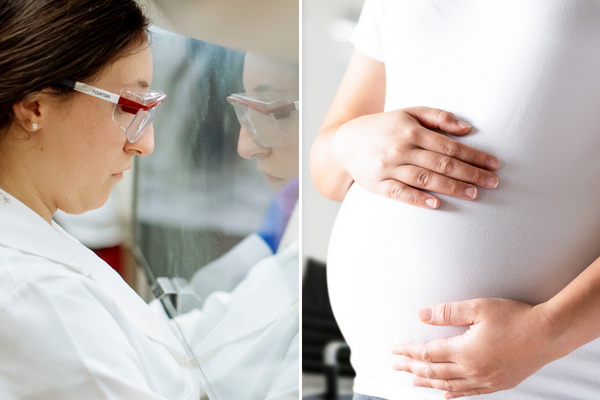Center for Women’s Health Engineering launches
Michelle Oyen heads university-wide center, housed in McKelvey Engineering

Women’s health covers decades of a woman’s life, from puberty through post-menopause, including myriad clinical issues, such as pregnancy and preterm birth, pelvic floor disorders, endometriosis and various cancers of the reproductive system.
To meet the need for research and education for this rapidly expanding field covering half of the world’s population, Washington University in St. Louis is launching the Center for Women’s Health Engineering. The interdisciplinary center, to be housed in the McKelvey School of Engineering, will include faculty from both McKelvey Engineering as well as the School of Medicine, including the Department of Obstetrics and Gynecology and the Program in Physical Therapy, among others. In addition to collaborative research, the center will lead education and training for undergraduate students through postdoctoral researchers, encourage innovation and technology transfer and participate in outreach to both researchers and the community.
The center will launch with an event that includes a presentation by Michael House, MD, associate professor of obstetrics and gynecology at Tufts University School of Medicine and a specialist in maternal-fetal medicine at Tufts Medical Center, at 4 p.m. Sept. 22 in Whitaker Hall Auditorium.
The data on women’s health issues reflect the need for more research. Worldwide, preterm birth, or birth prior to 37 weeks’ gestation, occurs in one in 10 pregnancies, and pregnancy loss affects between 10% and 15% of known pregnancies. Pelvic floor disorders occur in one-fourth of women throughout their lifetimes, and nearly 100,000 women are diagnosed with cancer of the reproductive organs annually.
“While there are some women’s health conditions that are well studied, such as breast cancer, there are several gynecological cancers, such as uterine, ovarian and cervical that are very understudied,” said Michelle Oyen, director of the center and associate professor of biomedical engineering. “WashU’s strengths, with our world-leading ob/gyn department, dictate that we're focused on the reproductive organs, and that includes gynecologic cancers as well as reproduction, fertility, preterm birth and maternal health.”
That research need can be met by engineers in collaboration with clinicians and medical researchers, Oyen said. This was the impetus behind the Collaboration Initiation Grants to faculty from McKelvey Engineering and the Department of Obstetrics and Gynecology that award up to $30,000 for one year.
“Engineering experts and physical scientists bring different tools ideally suited to solve 21st century challenges in women’s health research,” Oyen said. “We can make in vitro models, benchtop models of biomaterials, microfluidic devices and computational models.”
In addition to additional research, there is a need for more women inventors. A 2021 paper in Science showed that patents with all-women inventor teams are 35% more likely than all-male teams to focus on women’s health. In addition, only 35% of scientists in the STEM fields and 13% of patent holders are women, suggesting that the gender gap in those who commercialize their ideas contributes to the gap in what type of ideas get invented.
Over the past several years, WashU has gained national recognition for its women’s health technologies initiative bolstered by collaborative research and faculty who are key members of the center, including Quing Zhu, the Edwin H. Murty Professor of Engineering in biomedical engineering, who develops imaging methods to diagnose cancer of the reproductive organs in early stages as well as to predict and monitor treatment; Christine O’Brien, assistant professor of biomedical engineering and instructor of radiology in the School of Medicine, who is developing imaging tools to solve global problems in maternal-fetal health and reproductive diseases; Yong Wang, associate professor of electrical & systems engineering in McKelvey Engineering and of obstetrics and gynecology and of radiology in the School of Medicine, who is developing a novel hybrid noninvasive imaging system to study electrical maturation and microstructural changes of the pregnant uterus; and Oyen, whose research uses experimental and computational biomechanics techniques to study human pregnancy and preterm birth.
From the School of Medicine, key faculty include Sarah England, professor of obstetrics and gynecology, who determines if disruptions in circadian rhythms increases the risk for poor reproductive outcomes; and Tracy Spitznagle, professor of physical therapy and of obstetrics and gynecology, whose research focuses on pelvic floor muscle impairments in women with painful bladder syndrome and urinary urgency.
A full list of participating faculty members can be found here.





